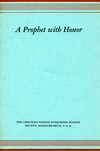

Are you sure?
This bookmark will be removed from all folders and any saved notes will be permanently removed.
"Whom say ye that I am?"
It is apparent to the student of the four Gospels that as Jesus progressed in his holy ministry he became increasingly convinced of the sacred importance of his mission. As the understanding grew upon him that he was the very Messiah, with all that this conviction implied, he saw the necessity of impressing his followers as to his status and position as Saviour and Way-shower to mankind. Otherwise, his message, per se, might not carry the weight it deserved. Its source must be known. If, as many believed, he was just another teacher, a rabbi, preaching to the people, with only the inspiration and authority common to his class, his holy mission would not be recognized and his message would fail. But knowing as he did that he was commissioned of God to reveal to humanity the Christ, Truth, which alone is its Saviour, then he must be known in his true role as the Son of God, the Anointed, the Redeemer of mankind.
None can gainsay that the long hours devoted to prayer in holy communion with his Father, God, brought the assurance which gave authority to his words and enabled him to convince his sympathetic followers both of his relation to God and of his mission as the Messiah. It was out of the depth of understanding as to his spiritual status that he could declare, "Heaven and earth shall pass away, but my words shall not pass away." Without this absolute conviction as to his real nature and the mission to which he had been commissioned, his words might, indeed, have sounded hollow. When uttered with divine authority, they were fraught with tremendous import to humanity. The problem, then, which he faced was to convince his disciples, and as many others as possible, of his status as the Son of God. His purpose was in no sense to exalt his human personality, but to reveal God as the loving Father, ever prepared to meet the needs of humanity.
No better evidence of Jesus' unquenchable desire that he be known in his true role of Messiah appears in the Gospels than the experience related in the sixteenth chapter of Matthew. Yearning to be understood, one day at Caesarea Philippi, he suddenly asked his disciples, "Whom do men say that I the Son of man am?" Was he merely a mortal, a rabbi, born of the flesh? To his query came the reply, "Some say that thou art John the Bapist: some, Elias; and others, Jeremias, or one of the prophets." This reply proves that his divinity and mission were not understood. Dissatisfied with the answer, and determined to elicit their own view of himself, he put the query directly, "But whom say ye that I am?" Others might not have caught the spirit of his words and works. The people might be excused for misunderstanding him. But his beloved disciples who had companioned with him day by day, surely they could have no such excuse. And one at least did know. Impetuous Peter knew, and out of his spiritual perception declared, "Thou art the Christ, the Son of the living God."
Enjoy 1 free Sentinel article or audio program each month, including content from 1898 to today.
JSH Collections
This article is included in:
1939 - PAMPHLET
A prophet with honor
JSH-Online has hundreds of pamphlets, anthologies, and special editions for you to discover.

July 9, 1938 issue
View Issue-
"Whom say ye that I am?"
ALBERT F. GILMORE
-
"Trusting God with our desires"
LILLIAN M. MC CULLOUGH
-
"Study thoroughly the letter"
ALBERT C. MOON
-
"They offered willingly"
GRACE SWENARTON
-
The One Power
LAURA TOTTEN YODER
-
The Deathless Word
MAUDE DE VERSE NEWTON
-
In a recent issue there appeared an article under the...
Louis N. Denniston, Committee on Publication for the State of Connecticut,
-
In your issue of October 6, a correspondent tells of a lady...
Edgar G. Harris, Committee on Publication for South Island, New Zealand,
-
In an article by a clergyman it was gratifying to read...
Miss Constance M. Frost, Committee on Publication for Queensland, Australia,
-
Christian Scientists will have read with much interest the...
Paymaster Capt. John W. E. Gilhespy, Committee on Publication for Devonshire, England,
-
Winning the Prize
Duncan Sinclair
-
No Substitute for Demonstration
Violet Ker Seymer
-
The Lectures
with contributions from Lilian Mary Schnage, Madeleine Sohier, Elmer F. Backer, Ernest Gustav Lorenzen, Everett Linus Purcell
-
I am sincerely and humbly grateful for Christian Science
Rae F. Kaufman
-
In humility, and with sincere gratitude to God and to our...
Helen J. Wright
-
Christian Science has been my only physician for the...
Charles S. Suter
-
It is with gratitude for the testimonies in the periodicals,...
Nelle F. Barnes Bowers
-
Many years ago Christian Science was presented to me,...
Laura V. Hollies with contributions from Beth Hollies Benton
-
It is with sincere gratitude that I can say, Christian Science...
Grace Smith Kozlay
-
"Freely ye have received, freely give"
MILDRED S. POWELL
-
Signs of the Times
with contributions from J. T. McKissick, Theodore Gerald Soares
-
General Activities Meeting of The Mother Church
with contributions from Helen Chaffee Howard, The Christian Science Board of Directors, William M. Bartlett, Grace F. Cudworth, Ernest C. Sherburne, Violet Ker Seymer, Wilfred Becket Wells, Daisette D. S. McKenzie


